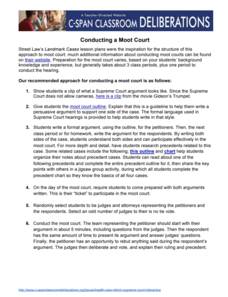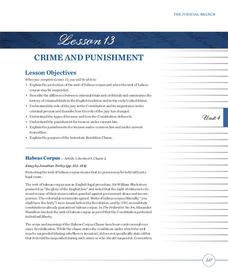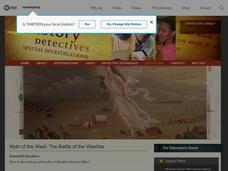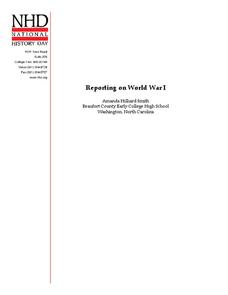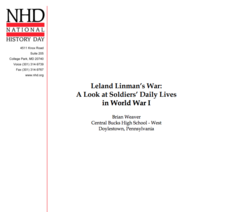C-SPAN
Conducting a Moot Court
Review the conduct of different roles within the Supreme Court. A moot court activity educates learners about the roles of each member of the court and the process of a case with video clips, research activities, a graphic organizer,...
Facing History and Ourselves
Laws and the National Community
When it comes to the law, is justice always served? Teach scholars about how law sometimes enables prejudice of entire groups of people with a unit on World War II that includes a warm-up activity, analysis of primary sources,...
Amnesty International
Respect My Rights, Respect My Dignity Module Three – Sexual and Reproductive Rights Are Human Rights
Give learners the support they need to take action in their communities when it comes to sexual and reproductive rights. A resource teaches the class about global issues surrounding gender inequality, including both readings and...
C-SPAN
Make a “Deliberations” Site
Many hot button issues require deliberations, even in your classroom! Learners work in teams or as individuals to decide on a deliberation question to make into a Google site. They research the topics in depth, discuss both sides of the...
University of California
The Vietnam War (1945 – 1975)
Have you ever wanted to do something so perfectly you wound up not doing it well at all? Young historians use primary and secondary documents to analyze the United States involvement in the Vietnam War. The issues surrounding the...
C-SPAN
Student Symposium and Resulting Action
Your class may not be able to vote yet, but that doesn't mean they can't feel like they're part of the presidential election! The resource creates a symposium where pupils debate about a selected topic in current events during an...
Heritage Foundation
Crime and Punishment
You wouldn't give someone a 10-day timeout for eating a piece of candy. The US government, too, does not believe in unreasonable punishment. A variety of exercises exploring the clauses of the US Constitution prompts class members to...
PBS
Using Primary Sources: Nazi Spy Ring Busted
Spy games are not just for professionals anymore! Scholars use short video clips, primary documents, and photographs to investigate Nazi spies in America during World War II. The young detectives analyze the paranoia warfare can create...
PBS
Myth of the West: The Battle of the Washita
Go West, young man! Scholars use PBS video clips, slide shows, and interactive materials to create a picture of Manifest Destiny in the American West. Using a variety of primary and secondary sources, young historians learn about the...
PBS
Myth of the West: Kit Carson to the Rescue
There's nothing like the Wild Wild West! Scholars investigate the American Frontier through the eyes of Kit Carson. To complete the first installment of a three-part series, they use presentations, a short video, and primary and...
National Endowment for the Humanities
Victory and the New Order in Europe
A New Order in Europe calls for a new lesson plan! This third plan in a series of four sequential lessons encourages high schoolers to read primary sources about the development of the New Order and follow up their knowledge with a...
National History Day
Reporting on World War I
Throughout history, newspapers have reported the events of the day as they unfolded. Using primary and secondary sources from World War I, scholars uncover how the American people learned of the events of the War to End All Wars. History...
National History Day
Leland Linman’s War: A Look at Soldiers’ Daily Lives in World War I
Hunkering down in the trenches of World War I, Leland Linman decided to write a journal about his experiences. By reading Linman's entries in the fourth installment of an eight-part lesson series, scholars get a firsthand look at life in...
Stanford University
Beyond Vietnam
On April 4, 1967 Martin Luther King, Jr. delivered his speech "Beyond Vietnam." The controversy that followed is the focus of a three-lesson unit that asks class members to consider the political and social implications of King's stance.
PBS
The Sixties: Dylan Plugs in and Sells Out
Before Woodstock, there was Newport. Get plugged in to the social changes of the 1960s with a lesson that looks at Bob Dylan's performance at the 1965 Newport Folk Festival as a symbol of the radical changes that marked the era.
PBS
The Sixties: Notes from the Ho Chi Minh Trail
Young historians research the rationales for fighting the Vietnam War, and the controversies surrounding it. They watch film clips, examine photographs, and read Lyndon B. Johnson's message to Congress to gather information for a...
Teaching History
Jamestown: The Starving Time
Students analyze a variety of primary and secondary sources to determine the cause of the Jamestown starving time during the winter of 1609–1610.
Space Awareness
Navigation in the Ancient Mediterranean and Beyond
Ancient texts, like Homer's Odyssey, mentions navigating ships by observing constellations. Pupils learn about the link between history and astronomy as they relate to navigation in the Bronze Age. Scholars complete two hands-on...
Constitutional Rights Foundation
Naturalized Citizens and the Presidency
Article II, Section 1 of the U.S. Constitution takes center stage in a lesson plan that asks class members to assume the role of state senators, debate a resolution to amend the U. S. Constitution to permit naturalized citizens to run...
Story Corps
The Great Thanksgiving Listen
StoryCorp provides a resource that captures and preserves the remembrances of family or community elders. Prior to the Thanksgiving holiday, class members select a person they want to interview, record the conversation, and then upload...
Stanford University
Historical Thinking Chart
Narrow down your questions about author perspective, historical context, and veracity of claims in a document with the help of a historical reading chart. Learners track the basics of the document along with advanced evaluation skills...
National Endowment for the Humanities
The Victor's Virtue: A Cultural History of Sport
Pupils explore the meaning of the ancient Greek word aretê and the place of virtue in historical athletic competition and modern sports. They begin by reading an informational text on the goal of sports in education, and then evaluate...
iCivics
We the Jury
Learners take on the roles of jurors in a civil case to evaluate evidence and determine a verdict in this engaging online interactive experience.
GCSE Modern World History
Mao's China
Here is a great textbook chapter on China's establishment as a communist state in 1949 and the effects of World War II on the nation. The first page prompts learners to complete a timeline activity as they read the material, which...


